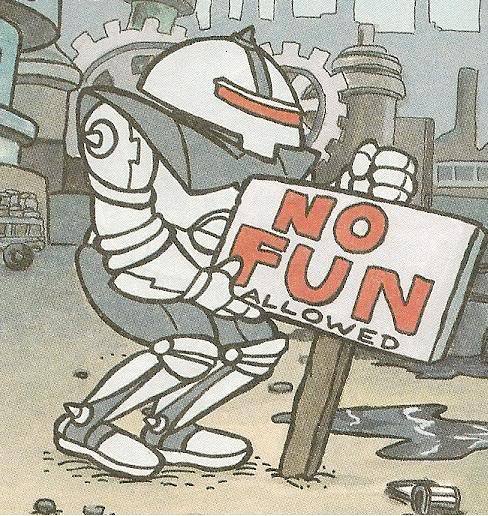
So say a few state-run newspapers in China!
Here's a somewhat funny/weirdly depressing story to digest today.
Anyone here familiar with the Doraemon cartoon? He's a giant, plump blue feline who has a seemingly bottomless front pouch housing a vast array of fantastical gadgets, who lives in the house of a schoolchild, and delivers entertaining moral stories to children of East Asia everywhere! And now he has a 3D CG film that will surely be a handsome box office success.
And a few Chinese newspapers seem to cry that the cat has pissed into their cereal this morning, because DAMN THOSE NEFARIOUS JAPANESE! Doraemon is not some loveable cartoon series for all children to enjoy! It is actually a conspiracy to not only export more evil Japanese culture around the region, but it's also a tool used by that evil Tokyo government to cover up - dun, dun, dun - Japanese war crimes in the Second World War.
That's right! All along this pudgy demon spawn has been teaching not morals, but he's been brainwashing our children into forgetting that the Nanjing atrocities ever happened, that pleasure women were ever a thing, and that Japan might have been murderous imperialists! Soon our children will dump history altogether and never know that Japan did any bad stuff!
“We have to be clear about the strong political meaning behind [the cartoon], the Chengdu Daily, the Communist Party’s main newspaper in the capital of Sichuan province, warned on Thursday. The Chengdu Evening Post and the Chengdu Business Daily ran similar commentaries on Wednesday.
“Doraemon is a part of Japan’s efforts of exporting its national values and achieving its cultural strategy; this is an undisputed fact. Taking this to heart, we should be less blind and keep a cool head while kissing the cheeks of the chubby blue guy,” the newspaper said.
The Chengdu newspaper said consumers of Japanese pop culture should “be clear about the murky nature of Japanese culture and never forget history”.
“Doraemon is a part of Japan’s efforts of exporting its national values and achieving its cultural strategy; this is an undisputed fact. Taking this to heart, we should be less blind and keep a cool head while kissing the cheeks of the chubby blue guy,” the newspaper said.
The Chengdu newspaper said consumers of Japanese pop culture should “be clear about the murky nature of Japanese culture and never forget history”.

Has this worked? As East Asia stands precariously at the mercy of deep nationalism, has this alarming warning signalled by these few Chinese newspapers resonated well with the Chinese people? Is the Japanese embassy now under siege? Are massive rallies against the fat cat and other corrupting Japanese stuff like Pokemon being staged in major cities as we speak? Is it Kristallnacht for any poor cinemas daring to play the film? Is the military about to shoot on sight anyone suspected of being a Doraemon sympathiser?

Not really. Though folks in China are hardly about to sing the praises of the rightwing nationalist Japanese government in power at the moment, there's not really a similar aversion to Japanese products and pop culture (at least not since the last Diaoyu/Senkaku island affair). Japan is even the most desired holiday destination for wealthy Chinese travellers.
Reactions on social media indicate that many disagreed with the paper’s reasoning.“Dear government, be assured that we won’t be fooled,” one microblogger wrote.
“The world adults live in is just too frightening,” another one wrote with sarcasm.
“The world adults live in is just too frightening,” another one wrote with sarcasm.
A survey conducted earlier this year indicated that 53.4 per cent of Chinese expect a military confrontation with Japan, while 29 per cent of Japanese expect war with China.
South China Morning Post (subscription wall applies)


